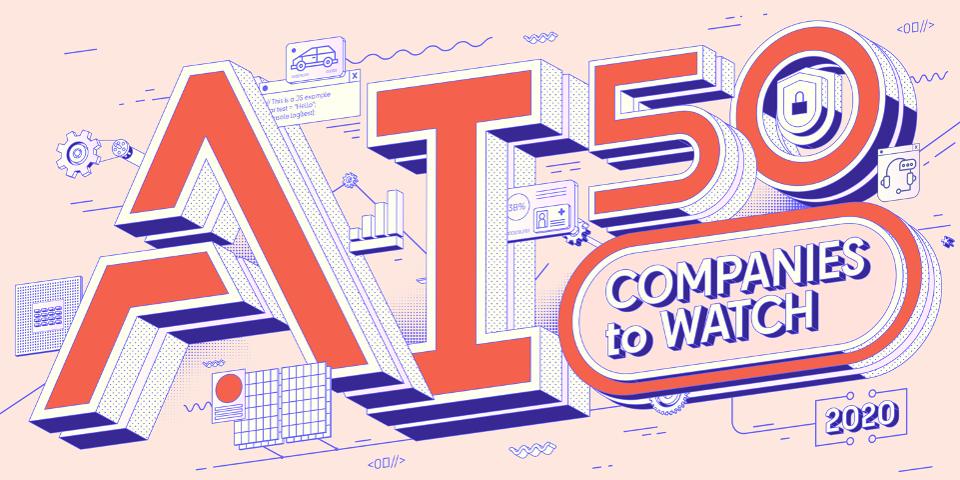Artificial intelligence is beginning to be usefully deployed in almost every industry from customer call centers and finance to drug research. Yet the field is also plagued by relentless hype, opaque jargon and esoteric technology making it difficult for outsiders identify the most interesting companies.

copyright by www.forbes.com
To cut through the spin, Forbes partnered with venture firms Sequoia Capital and Meritech Capital to create our second annual AI 50, a list of private, U.S.-based companies that are using artificial intelligence in meaningful business-oriented ways. To be included, companies had to be privately-held and focused on techniques like machine learning (where systems learn from data to improve on tasks), natural language processing (which enables programs to “understand” written or spoken language), or computer vision (which relates to how machines “see”).
The list was compiled through a submission process open to any AI company in the U.S. The application asked companies to provide details on their technology, business model, customers and financials like funding, valuation and revenue history (companies had the option to submit information confidentially, to encourage greater transparency). In total, Forbes received about 400 entries. From there, our VC partners applied an algorithm to identify the 100 with the highest quantitative scores and then a panel of eight expert AI judges identified the 50 most compelling companies.
“It’s not about creating some magic algorithms,” says judge Anima Anandkumar, a Caltech professor and Nvidia’s director of machine-learning research. “Focus on the problem and impact side.”
Among the notable trends this year: Augmented intelligence, which seeks to help humans do their jobs better and not replace them, is on the rise as the excitement over full automation loses some steam. Self-driving tech startups remain hot; the seven autonomous vehicle companies on this year’s list have raised over $3 billion in total venture capital. Another area to watch: AI applications to discover drugs or diagnose diseases faster.
In terms of valuation, at least 10 of the AI 50 are valued at $100 million or less, while 13 are unicorns valued at $1 billion or more. Silicon Valley remains the hub for AI startups, with 34 of 50 honorees coming from the San Francisco Bay Area. […]
read more www.forbes.com


Artificial intelligence is beginning to be usefully deployed in almost every industry from customer call centers and finance to drug research. Yet the field is also plagued by relentless hype, opaque jargon and esoteric technology making it difficult for outsiders identify the most interesting companies.
copyright by www.forbes.com
To cut through the spin, Forbes partnered with venture firms Sequoia Capital and Meritech Capital to create our second annual AI 50, a list of private, U.S.-based companies that are using artificial intelligence in meaningful business-oriented ways. To be included, companies had to be privately-held and focused on techniques like machine learning (where systems learn from data to improve on tasks), natural language processing (which enables programs to “understand” written or spoken language), or computer vision (which relates to how machines “see”).
The list was compiled through a submission process open to any AI company in the U.S. The application asked companies to provide details on their technology, business model, customers and financials like funding, valuation and revenue history (companies had the option to submit information confidentially, to encourage greater transparency). In total, Forbes received about 400 entries. From there, our VC partners applied an algorithm to identify the 100 with the highest quantitative scores and then a panel of eight expert AI judges identified the 50 most compelling companies.
“It’s not about creating some magic algorithms,” says judge Anima Anandkumar, a Caltech professor and Nvidia’s director of machine-learning research. “Focus on the problem and impact side.”
Among the notable trends this year: Augmented intelligence, which seeks to help humans do their jobs better and not replace them, is on the rise as the excitement over full automation loses some steam. Self-driving tech startups remain hot; the seven autonomous vehicle companies on this year’s list have raised over $3 billion in total venture capital. Another area to watch: AI applications to discover drugs or diagnose diseases faster.
In terms of valuation, at least 10 of the AI 50 are valued at $100 million or less, while 13 are unicorns valued at $1 billion or more. Silicon Valley remains the hub for AI startups, with 34 of 50 honorees coming from the San Francisco Bay Area. […]
read more www.forbes.com
Share this: